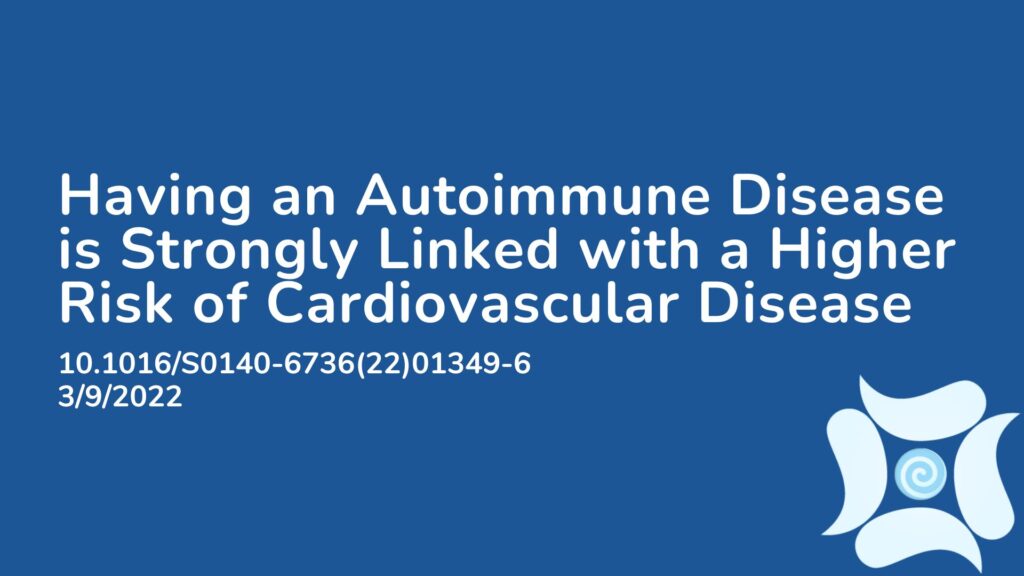Summary:
This study is a large population-based study of 22 million individuals from the UK, looking at prevalence of 19 common autoimmune diseases and 12 common cardiovascular diseases. The aim of the study was to assess whether there is an increased risk of cardiovascular disease when autoimmune disease is present. The results showed extremely strong correlations between the two, as risk for every individual cardiovascular disease increased progressively with the number of autoimmune diseases present. Among the included autoimmune diseases, systemic sclerosis, Addison’s disease, systemic lupus erythematosus and type 1 diabetes had the highest risk of developing cardiovascular disease. This means that individuals with autoimmune disease have a higher risk of developing cardiovascular disease than those who do not have an autoimmune disease.
Abstract:
Background: Some autoimmune diseases are associated with an increased risk of cardiovascular disease. We aimed to determine whether or not this is true, and to what extent, for a broad range of autoimmune conditions. Methods: In this population-based study, we used linked primary and secondary care records from the Clinical Practice Research Datalink (CPRD), GOLD and Aurum datasets, to assemble a cohort of individuals across the UK who were newly diagnosed with any of 19 autoimmune diseases between Jan 1, 2000, and Dec 31, 2017, younger than 80 years at diagnosis, and free of cardiovascular diseases up to 12 months after diagnosis. We also assembled a matched cohort with up to five individuals matched on age, sex, socioeconomic status, region, and calendar year, who were free of autoimmune disease and free of cardiovascular diseases up to 12 months after study entry. Both cohorts were followed up until June 30, 2019. We investigated the incidence of 12 cardiovascular outcomes and used Cox proportional hazards models to examine differences in patients with and without autoimmune diseases. Findings: Of 22 009 375 individuals identified from the CPRD databases, we identified 446 449 eligible individuals with autoimmune diseases and 2 102 830 matched controls. In the autoimmune cohort, mean age at diagnosis was 46·2 years (SD 19·8), and 271 410 (60·8%) were women and 175 039 (39·2%) were men. 68 413 (15·3%) people with and 231 410 (11·0%) without autoimmune diseases developed incident cardiovascular disease during a median of 6·2 years (IQR 2·7-10·8) of follow-up. The incidence rate of cardiovascular disease was 23·3 events per 1000 patient-years among patients with autoimmune disease and 15·0 events per 1000 patient-years among those without an autoimmune disease (hazard ratio [HR] 1·56 [95% CI 1·52-1·59]). An increased risk of cardiovascular disease with autoimmune disease was seen for every individual cardiovascular disease and increased progressively with the number of autoimmune diseases present (one disease: HR 1·41 [95% CI 1·37-1·45]; two diseases: 2·63 [2·49-2·78]); three or more diseases: 3·79 [3·36-4·27]), and in younger age groups (age <45 years: 2·33 [2·16-2·51]; 55-64 years: 1·76 [1·67-1·85]; ≥75 years: 1·30 [1·24-1·36]). Among autoimmune diseases, systemic sclerosis (3·59 [2·81-4·59]), Addison’s disease (2·83 [1·96-4·09]), systemic lupus erythematosus (2·82 [2·38-3·33]), and type 1 diabetes (2·36 [2·21-2·52]) had the highest overall cardiovascular risk. Interpretation: These findings warrant targeted cardiovascular prevention measures, in particular in younger patients with autoimmune diseases, and further research into pathophysiological mechanisms underlying these complications.
Article Publication Date: 3/9/2022
DOI: 10.1016/S0140-6736(22)01349-6



